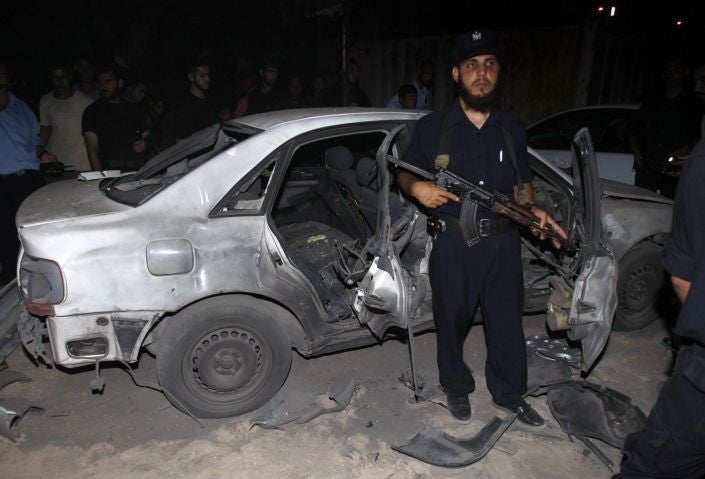The Weekend's TV: Car Bomb, Sun, Channel 4<br />Arena: Cab Driver, Sat, BBC4
When terrorists take the driving seat

Now here's an intriguing talking head – a Lebanese man of cheery demeanour and an odd asymmetry to his gaze. There's something about his face that isn't quite right, you think, a creased, spattered quality that hints at old damage. During the civil war, it turns out, he was the go-to man if you suspected that someone might have parked several kilos of high-explosive outside your front door, and he'd been gone to by Bob Baer, the presenter of Car Bomb because Beirut was an important chapter in the history of this entry-level guided missile, which can do for a few hundred dollars what it takes the Pentagon billions to achieve. And then Mahmoud took a sip of his tea and you saw that he had no hands any more. He'd got so good at defusing car bombs that his opponents had eventually decided he needed defusing himself.
Baer, an ex-CIA man who'd been working in Beirut when a car bomb killed 63 people, including many of his colleagues, at the American Embassy in 1983, was no mere tourist/reporter here. In a phrase that acquired a queasy literalness in this context you sensed that he knew where the bodies were buried, and probably knew quite a few of the people who'd put them there. He even confessed that he'd been taught how to construct a car bomb himself while training at Langley, a passing remark that left you wondering just how hands-on his expertise was. But the the film he'd made was fascinating, a history of a weapon that began, against the grain of expectation, at the heart of Wall Street, where, in 1920, unknown bombers left a horse-drawn wagon packed with dynamite and sash-window weights and killed 40 people. You can still see the chips in the masonry.
Car bombs are popular with murderers on a tight budget because they deliver so much for so little. You can make the bomb bigger, drive it to the target and you get a disguise thrown in for free, a casing that can be left on pretty much any urban street without arousing suspicion. It does require one mental adjustment, though, an acceptance that it won't be very discriminating in its destruction. In the Middle East, where the car bomb really came of age during the conflicts in Palestine in the 1940s, Baer showed you it was a moral accommodation that bombers found all too easy to make. "We killed only people who were directly involved in fighting against the Jewish will to establish an independent homeland," said two former members of the Lehi, a Zionist group who attacked Palestinian civic buildings with car bombs. "In the Zionist State, every inhabitant of this state was trained and ready," replied the elderly sister of Fawzi al-Qutb, a Palestinian bomber who had lead the retaliations. It isn't a child, the car bomber says, it's a soldier in the making.
Intriguingly, given the Middle East's dogged commitment to R&D in this particular field, Baer's final example came from the American heartland again – the 1970 bombing of a Wisconsin University maths research centre, targeted by anti-war radicals because it was sponsored by the Pentagon. It was an object lesson in the simplicity of such devices, constructed for less than $200 by mixing agriculture fertiliser and diesel oil to a recipe that the bombers found under the helpful entry for "Explosives" in Encyclopedia Britannica. One can only hope the ingredients are a little more carefully monitored these days, since it isn't easy to prevent a detailed history of the car bomb from looking very much like an advert for its lethal virtues, particularly if you draw as heavily as Car Bomb did on jihadi videos of the product in action.
Arena: Cab Driver reminded you that occasionally the explosive payload is actually in the driving seat, with a very short fuse attached. Zimena Percival's film, the third of a trilogy on public transport, considered the psychological costs of cab-driving, which can include violent spasms of involuntary misanthropy. It was a film that began in anecdotal blitheness, talking to ancient cabbies and apprentice ones about the trade, and the merciless discipline needed to acquiring the Knowledge. And more than once it seemed to grind to a halt in the traffic, engine ticking over as Percival weaved together another audio-visual composition, or got distracted by some choice Sid James's clip from a 1950s B-movie. The chief finding – that it's a bit of a samey job once you've got used to it – didn't seem quite enough to justify the self-advertising craft of the thing. I fear quite a lot of people will have got out and walked, but if you stayed it eventually shaped itself into something distinctive and even moving. Len, who'd taken himself off for a self-help weekend when the trademark weltschmertz got too much for him, had actually gone to Trafalgar Square to deliver a collective apology for his bad temper to everyone in London. Apology accepted, Len.
Subscribe to Independent Premium to bookmark this article
Want to bookmark your favourite articles and stories to read or reference later? Start your Independent Premium subscription today.

Join our commenting forum
Join thought-provoking conversations, follow other Independent readers and see their replies